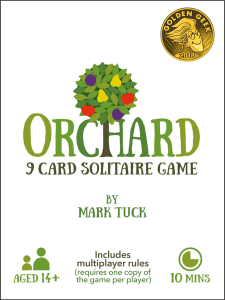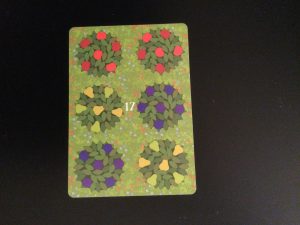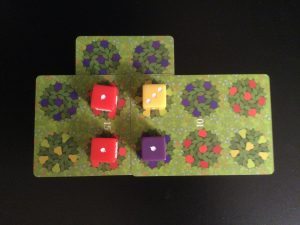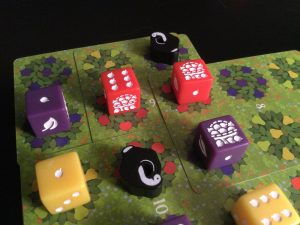| Publisher | Side Room Games |
| Design Credits | Mark Tuck |
| Art Credits | Mark Tuck |
| Game Contents | 18 orchard cards, 15 specialty six-sided dice in three colors, two wooden rotten fruit tokens, rules |
| Guidelines | Solitaire fruit-growing, pattern-matching, tile-laying puzzler |
| MSRP | $16 |
| Reviewer | Andy Vetromile |
“Sorghum: nature’s rich bounty.” – Tom Servo, Mystery Science Theatre 3000
Making a game is hard work; ask anyone who’s done it. But the fruits of one’s labors can be totally worth it, especially if you get to make terrible puns and jokes about it along the way. So it is with Orchard, a solitaire game of growing trees.
The object is to score as many points at harvest time as possible (preferably without making puns about it).
One to one players – so, pretty much just the one – is in charge of a field of fruit-bearing trees. That is, so long as he does his job right. From a deck of 18 numbered cards he pulls half of them, shuffles them up, and flips one face-up in the middle of the table. This is where the tiny acorns Ben Franklin was always on about are seeded. He pulls another two cards to make his “hand” and chooses one to play.
The cards display six trees, two each of yellow (pears), red (apples), and purple (plums, if appearances are to be believed) in different arrangements. If the player places a card atop the start card and matches the colors, he may place a die of that color from the supply on each match. Well-boled. There are five dice of each color and these are specialty six-siders that have two purely decorative sides and four of increasing pip values. Your match is worth one pip or point, and if you do that again with another card the second match rotates the die to tree . . . er, three. It then goes to six and finally a little gift basket graphic showing 10. Putting a card down that doesn’t match all the underlying trees is prohibited unless one employs a Rotten Fruit token. These counters, placed on a tree, circumvent the “matches only” rule, but they come with their own checks and balances.
You can only place rotten fruit on a single tree; it doesn’t absolve one from mismatching the entire card. Once placed no more cards can go atop that tree. There are only two such counters so the pear of them must be employed wisely. And there’s a scoring penalty for each one so used.
Once all eight cards have been placed on the starter card, the season is over and the player totals his harvest. The game offers a list of potential scores for comparison to determine how well one did.
It’s always nice to see a game with some robust components, but oddly the box may be the best. It’s a sturdy, thick-walled little number that slides easily in and out of its top. The illustration thereon is unassuming and simple and the paper that covers the box doesn’t look like it’s going to adhere for the life of the product so don’t leave it in your hot car for too long. The rest of the pieces fit very neatly inside, and that includes the 15 – count them, 15 – quality specialty six-siders and two wooden Rotten Fruit tokens (also nifty and clever items). The cards are just the right weight and shuffle neatly, plus it’s nice to have a deck that splits evenly in two so you can play two games one after the other without added shuffling and preparation. The rules are clear and concise and show good illustrations of the game’s mechanics in action – not that it’s terribly unclear from the text but for those who like to have confirmation of what they think they’ve read, their fears are hereby laid to rest.
Orchard lives up to its 10-minute suggested timeframe, though one of the cool things about it is the laid-back nature of the game. It’s the sort of thinky little exercise that, if one wishes, can take logger . . . er, longer . . . and still feels relaxing as one looks for the perfect maneuver. There’s no rush to a solitaire game and it’s easy to get lost in the slow-burning action with the cards in one hand and a beverage in the other. Should you wish to go another root it also lends itself well to the call-and-play style where one person randomizes their deck and everyone uses the matching starter and hand of cards from their pile to implement their strategy. The drawback there is everyone needs their own deck – not such a big deal since 16 bucks is a low cost of entry but if you’re the type who likes to bring enough for the group you’ll have to buy the same game again.
Still, you’re getting your money’s worth on components. The cardstock and packaging are sweet, the plastic dice aren’t overly fancy but they’re at least clear (and have a tiny extra dot on the pips making them look like fruit), and the two wooden tokens are lightly painted, fancifully shaped, and amusingly illustrated. It’s compact and so is easy to carry about at (and play during) lunchtime, over branch . . . er, brunch . . . or otherwise on the go. Orchard is plum-p, juicy, and ripe for the picking.



